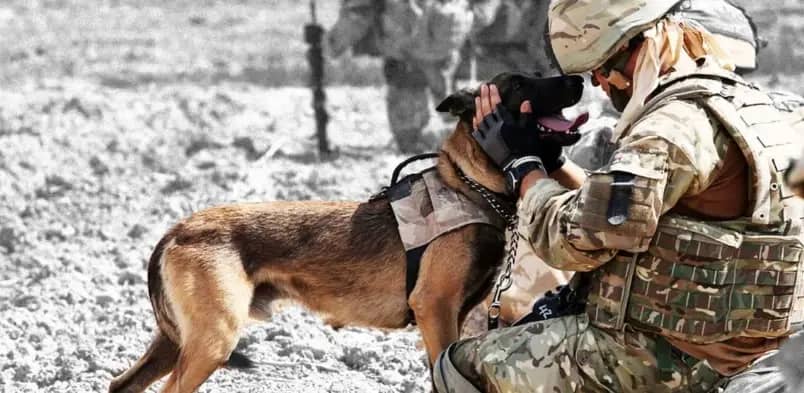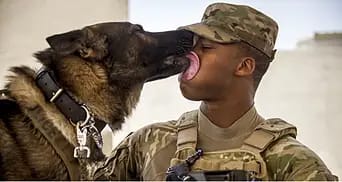Ironically, brave military dogs who have served alongside their human comrades on the frontlines of war are often left without a home once their service is over.
However, thanks to legislation signed by President Clinton in 2000, civilians can now adopt retired military working dogs (MWDs) and give them the loving homes they deserve.
Adopting a military dog is not only a noble act of service but also provides a sense of purpose to those who subconsciously desire to serve others. These dogs have been trained to detect explosives, track down enemies, and perform other crucial tasks, and they deserve a life of comfort and companionship after their service.
In this article, we will explore the process of military dog adoption, including the requirements, adoption suitability checklist, and tips for proper handling. We will also provide additional information about the military working dog foster program, adoption program, and resources for finding pet adoption groups and preparing for a new furry family member.
Join us in adopting a hero and giving a military dog a loving home!
Key Takeaways
- Military dog adoption allows civilians to rehome retired working dogs who may no longer be cut out for military lifestyles.
- MWDs may have assisted in various tasks, and many fled with Post Traumatic Stress Disorder, requiring a safe and neutral environment.
- The adoption process includes checking availability, reviewing adoption forms, meeting facility expectations, visiting a facility, and picking up the MWD with necessary items. Proper handling techniques are essential due to MWDs’ expensive training.
- Pet parents are responsible for any health issues and travel costs. The original dog handler has priority in adoptions whenever possible.
History and Legislation
The history and legislation surrounding military dog adoption, including President Clinton’s approval of a law in 2000, has allowed civilians to provide a loving home for retired military working dogs that are no longer suited for military lifestyles.
Before this law was passed, military war dogs were euthanized or given to an allied army.
Fortunately, 90% of military working dogs end up with their handlers, while a few are available for adoption.
Trained military dogs bring unique skills, training, and experiences to their new homes. However, it is important to remember that the transition from military life to civilian life can be challenging for these dogs. Patience, understanding, and ongoing training may be required to help them adapt to their new roles as family pets. With the right approach, these highly trained dogs can become loyal, loving companions in their post-military lives.
It provides a safe and neutral environment for retired military working dogs and allows them to receive the love and care they deserve for their loyal and dedicated service.
Adoption Process
To ensure the suitability of potential adopters, the military working dog adoption process includes a thorough vetting process that considers factors such as experience, fenced yard, and background checks. The adoption suitability checklist also contains descriptions of tenants, proof of landlord’s consent, and explanations of the dog’s details, including its medical history.
In addition, the vetting process also involves visiting a facility and picking up the MWD with necessary items such as a leash, collar, and crate. Connecting with the MWD is an essential part of the adoption process.
It is important to remember that these dogs have been trained to serve and protect their handlers and may have experienced trauma during their military service. Therefore, it is crucial to approach them with patience and understanding.
The adoption process also includes checking availability, reviewing adoption forms, and meeting the facility’s expectations. By completing the requirements and connecting with the MWD, potential adopters can provide a loving home to these hero dogs and give them the retirement they deserve.
Considerations for Pet Parents
Pet parents must consider the unique needs and potential challenges of adopting a retired military working dog. These dogs have been trained for specific tasks and may require additional training to adjust to their new life as a pet. It is essential to understand that MWDs are not ordinary pets and may have different needs than a typical rescue dog. Additionally, many MWDs retire with Post Traumatic Stress Disorder, which may require emotional support and a safe and neutral environment to help them adjust to civilian life.
When adopting a retired MWD, pet parents should also consider the training requirements. These dogs have undergone extensive training and must continue their training to help them adjust to their new environment. Depending on the dog’s needs, the activity may include socialization, obedience training, and other specialized training. Adopting a retired MWD can be a rewarding experience, but it is essential to understand the potential challenges and responsibilities that come with it. Pet parents can give these military heroes a second chance at a happy and comfortable life by providing a safe and loving home and meeting their unique needs.
Frequently Asked Questions
Are there any restrictions on who can adopt a retired military working dog?
While there are no specific restrictions on who can adopt a retired military working dog, potential adopters must meet veterinary requirements and pay adoption fees. However, the adoption process includes suitability checks and adherence to facility expectations.
How long does the adoption process typically take?
The adoption timeline for retired military working dogs varies based on availability, required paperwork, and facility expectations. Pet parents should expect to complete a background check, provide proof of landlord’s consent, and provide the necessary items to their new furry friend.
Can military working dogs be adopted by families with young children?
As military working dogs have intense training requirements, families with young children may not be suitable for adoption. However, the benefits of adopting a retired MWD include providing a safe and loving home for a loyal and hardworking companion.
What kind of training do military working dogs receive?
The rigorous training of military working dogs is designed to develop their special skills, which include detecting explosives, tracking, and attacking enemies. Canine soldiers are tough, loyal companions of the armed forces.
Are there any ongoing support services available for pet parents who adopt a retired military working dog?
Veteran support services are available for pet parents who adopt a retired military working dog. These include access to military veterinary clinics, Tricare coverage, and counseling services for PTSD. Additionally, pet healthcare is the responsibility of the pet parent.



